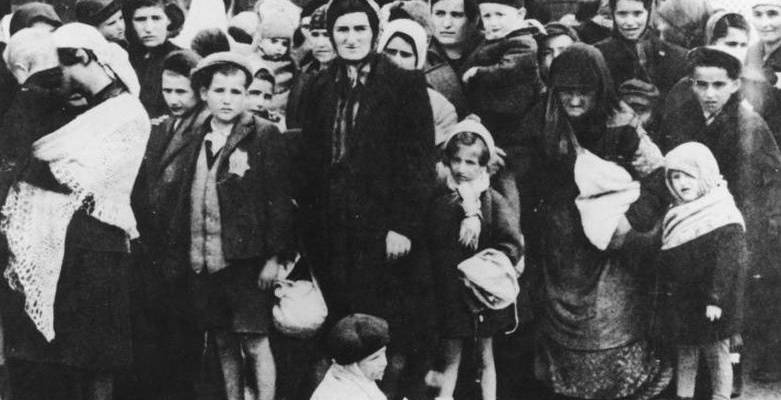Ordinarily, a rabbi would be impressed to hear that a Jewish congressman had taken matzohs with him to an international conference that took place during the week of Passover.
By Dr. Rafael Medoff
Meyer Nurenberger was not at all impressed by Congressman Sol Bloom’s boast about bringing matzohs to the Anglo-American conference on the refugee problem, held in Bermuda in April 1943.
It was the peak of the Holocaust. The Allies had confirmed that the mass murder of European Jewry was underway, but refused to take any concrete action to intervene.
To counter mounting public criticism of their hands-off policy, the British and American governments announced they would discuss the issue in a conference on the island of Bermuda, far from the prying eyes of demonstrators and the news media. Their intention was that “it will take place practically in secret, without pressure of public opinion,” the Zionist leader Nahum Goldmann surmised.
Congressman Sol Bloom of New York City, a former vaudeville entertainer, chaired the House Foreign Affairs Committee and strongly supported President Roosevelt’s restrictionist immigration policy. When Bloom was chosen as a member of the American delegation to the Bermuda conference, many in the Jewish community saw the choice as a ploy to deflect criticism of U.S. refugee policy. Assistant Secretary of State Breckinridge Long privately wrote in his diary that he chose Bloom because the congressman was known to be “easy to handle” and “terribly ambitious for publicity.”
The conference lasted 12 days, yet neither the U.S. delegation nor their British counterparts managed to come up with any serious rescue plans. The Roosevelt administration would not agree to the use of any trans-Atlantic ships to transport refugees, not even troop supply ships that were returning from Europe empty. There would be no increase in the number of refugees admitted to the United States. And the British refused to discuss Palestine as a possible refuge, because of Arab opposition. When the conference adjourned, the two governments decided to keep the proceedings of the conference secret, to mask how little they had achieved.
Congressman Bloom, however, announced that “as a Jew,” he was “perfectly satisfied” with the results. In his autobiography, published after the war, Bloom continued to defend the outcome of the Bermuda conference, arguing that any announcement of aid to the Jews would have led “to intensified persecutions.” Congressman Emanuel Celler (D-New York) characterized Bloom as “a sycophant of the State Department.”
It was shortly after Bermuda that Bloom encountered Meyer Nurenberger. The Polish-born Nurenberger, who had earned rabbinic ordination but opted for a career in journalism, arrived in the U.S. in 1939 and began working as a reporter and columnist for the Morgen Zhurnal, a leading Yiddish daily.
As Nurenberger later recalled, Bloom “told me that he took along matzohs when he left for Bermuda—it was the Passover season—because he was such a good Jew. So I told him that I thought it would have been more important for him to eat bread there and save some Jews rather than to eat matzohs. He was very angry and told me he was through talking to me.”
I asked Nurenberger’s daughter, the Canadian-Israeli journalist Atara Beck, about her father’s unusual choice of words. “My father was an ordained Orthodox rabbi, and of course he would never have wanted any Jew to eat bread on Passover,” she said. “He was making a point—and it was a powerful moral point—saving lives is more important than rituals such as eating matzoh. Every Jew, even a congressman, needs to be reminded of that from time to time.”
Nurenberger later cited a Talmudic anecdote to explain the phenomenon of prominent Jews who were more interested in fame and honor—such as serving on a U.S. government delegation—than in their welfare of the Jewish people. Nurenberger called it the “Mi BeRosh” [‘Who will be first?’] Syndrome.”
The anecdote, which appears in tractate Sanhedrin, concerns a Jewish king, Jeroboam, who caused a division of the Jewish commonwealth and even introduced idol worship, yet was given one last chance to repent. When Jeroboam died, the Talmud relates, God said to him, “If you repent, you and I and the Messiah will stroll together in the Garden of Eden.” To which Jeroboam replied, Mi beRosh? Who will be the one to walk at the head of the line? When God replied that Messiah would walk first, Jeroboam responded that he would not repent.
To which Nurenberger added this poignant commentary: “Since the days of Jeroboam, Mi BeRosh? has been the primary cause of lost opportunities and the greatest tragedies in Jewish history. Who will march at the front? Who will sit on the dais? Who will be Man of the Year? Who will be the leader? Who will deliver the main speech? Who will introduce whom at a meeting? Who will be applauded by the ladies’ auxiliary? Mi beRosh? How many Jews would have been saved during World War II if it had not been for Mi beRosh?”
Dr. Rafael Medoff is founding director of The David S. Wyman Institute for Holocaust Studies and author of 16 books about Jewish history and the Holocaust.


Send Passover Packages to Needy Israeli Soldiers - Bring Them Joy!
We are honored to thank the young men and women of the IDF who risk their lives every day to protect the citizens of Israel. Since October 7th, soldiers have been on the battlefield for months - many are hoping to come home for Passover.
Join us in sending Passover food packages (and personal notes) to Israeli soldiers and their families.
Many soldiers spend the Passover holiday with needy families back home. The soldiers greatly appreciate your love and concern. Bring them Passover joy!
CLICK HERE TO SEND YOUR PACKAGE AND NOTE TO ISRAELI SOLDIERS!




